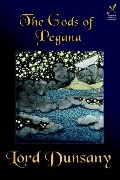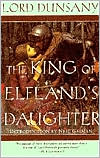“In
a wood older than record, a foster brother of the hills, stood
the village of Allathurion; and there was peace between the
people of that village and all the folk who walked in the
dark ways of the wood, whether they were human or of the tribes
of the beasts or of the race of the fairies and the elves
and the little sacred spirits of trees and streams.”
So writes
Edward,
Lord Dunsany
, in his short story, “The Fortress Unvanquishable,
Save for Sacnoth.”
Before J.R.R. Tolkien and The Lord of the Rings …
before H.P. Lovecraft with his tales of elder gods …
there was Edward John Moreton Drax Plunkett, poet, author,
Irish national chess champion, champion shooter, hunter …
And 18th
Lord of Dunsany, heir to – among other possessions –
Dunsany Castle, a modernized Norman castle in County Meath,
Ireland, that traces its beginnings to around 1180 –
considered at least one of Ireland's oldest continuously occupied
homes.
Born July 24, 1878, in London to a family whose Irish roots
may well predate the Norman invasion, Edward - “Eddie”
to his family – was the son of John William Plunkett,
a scholar and mechanical engineer credited with installing
the first Irish telephone system and developing his own x-ray
machine.
Eddie's
mother, Ernle Grosvenor, was a descendant of James Drax of
Barbados and related to Sir Richard Francis Burton, the British
scholar-explorer credited as the first European to find Lake
Tanganyika.
Edward's childhood was reportedly spent on family property
in Shoreham, Kent and Dunstall Priority as well as Dunsany
Castle, and he attended Cheam and Eton before entering Sandhurst
in 1896. He married Beatrice Child-Villiers, daughter of the
Earl of Jersey, in 1904, and their only child, Randal –
later 19th Lord Dunsany – was born in 1906.
By then,
Dunsany had already embarked on his career as writer. His
poem “Rhymes from a Suburb,” was published in
the Pall Mall Magazine in September 1897. It's his earliest-known
published work.
 The
Gods of Pegana, a book of short stories, came in
1905, and in 1909, the first of Dunsany's plays, The Glittering
Gate – written at the suggestion /request of William
Butler Yeats – opened to critical and public acclaim
at London's Abbey Theatre. The
Gods of Pegana, a book of short stories, came in
1905, and in 1909, the first of Dunsany's plays, The Glittering
Gate – written at the suggestion /request of William
Butler Yeats – opened to critical and public acclaim
at London's Abbey Theatre.
 The
King of Elfland's Daughter, considered a pioneering
work in modern fantasy, came in 1924. The
King of Elfland's Daughter, considered a pioneering
work in modern fantasy, came in 1924.
During
the intervening years, World War I interrupted Edward, Lord
Dunsany's career. Although in his mid-thirties when the war
started, he enlisted for active service that included time
in the trenches. After the Great War, he resumed writing and
lecturing, resuming his interest in poetry as well as fantasy.
World
War II imposed another interruption, during which Dunsany
served in the Home Guard and Local Defense Force. Returning
to civilian life again, he added radio broadcasts and television
appearances to his lectures – which included tours in
the United States – and writing.
In October
1957, the then-79-year-old Lord Dunsany suffered an attack
of appendicitis. Surgery was performed, but he never regained
consciousness. He died on Oct 25 in Dublin.
“Genre”
didn't exist as a term when Dunsany began writing. His works
included – besides fantasy, drama and poetry –
general fiction, science fiction and autobiography.
But it's
his fantasy that has put him on a par with the likes of Poe,
Morris and H. Rider Haggard. And his works are considered
to have influenced – among others – Tolkien, Lovecraft
and C.S. Lewis.
If it's
the job of the fantasy novelist – and it is –
to fill the reader with a sense of wonder, Lord Dunsany was
a master. The Elfland he created for his 1924 novel is a world
“beyond the fields we know” where time runs slower
and existence is cause for wonder.
The witch
Ziroonderel at one point chides the men of Erl (in our human
world) for complaining that their dealings with Elfland have
resulted in “overmuch magic”:
"Overmuch
magic! As though magic were not the spice and essence of life,
its ornament and splendour."
Before
Middle Earth, there was Elfland – and an Irish lord
who opened the gates to fantasy before we had a name for it.
|